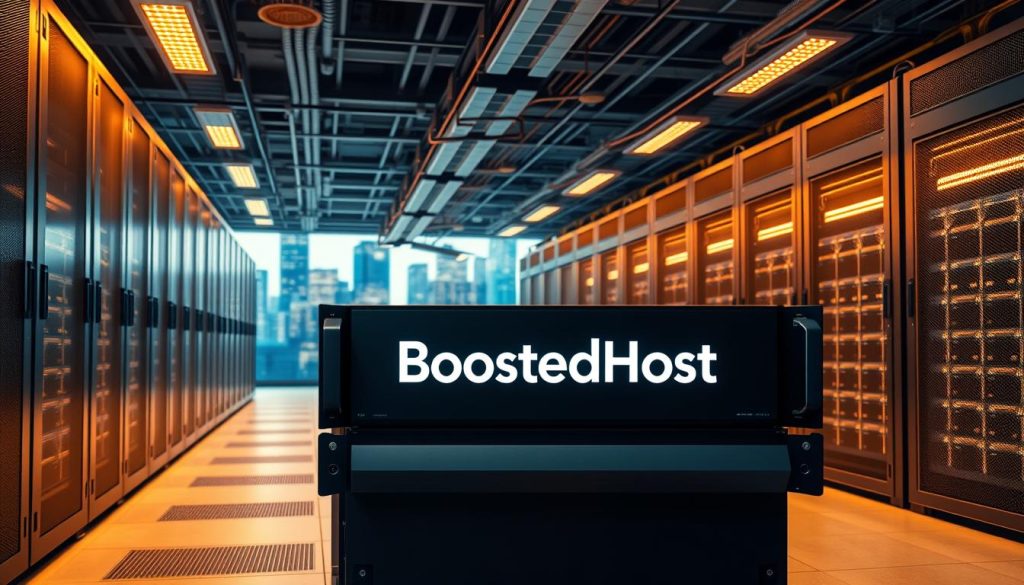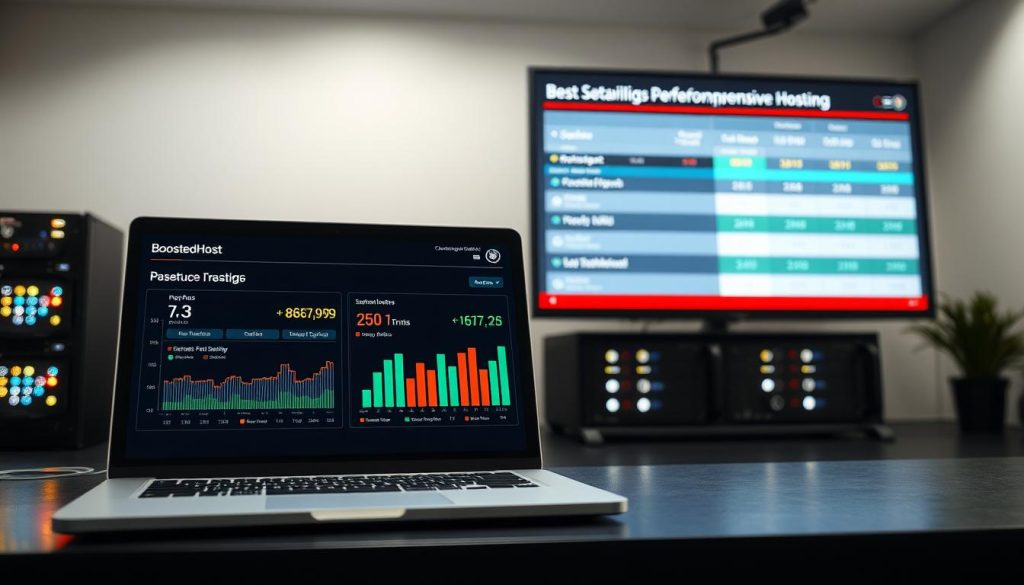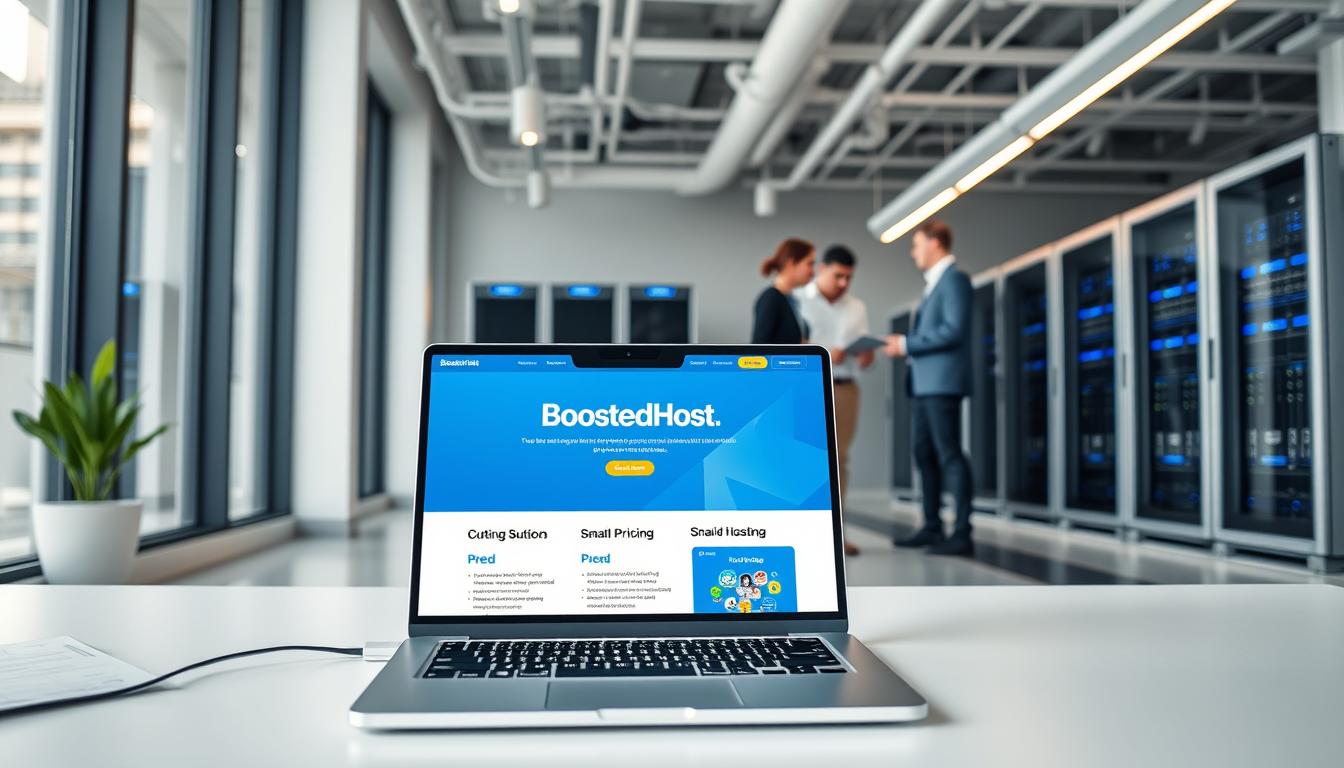We know the weight of picking the right host. It can feel personal — your site is your work, your store, your voice. We built this guide to remove doubt and give a clear, data-driven choice.
In this head‑to‑head we test real-world speed, uptime, pricing transparency, and support response. We focus on practical outcomes: how fast pages load, how often sites stay online, and what features are included on day one.
One company is a Swiss-based hosting provider known for LiteSpeed servers, global CDN, daily backups, and an AI website builder that spins up a professional site in minutes. The other is a managed host with NVMe storage, LSCache, and multilingual 24/7 support.
We’ll link to the Swiss-based hosting company for details and transparency: Swiss-based hosting company. Our tests use real sites and past benchmarks to reflect true business impact.
Key Takeaways
- We test for speed, uptime, pricing clarity, and support efficiency.
- One provider focuses on sub-200 ms TTFB with global CDN and daily backups.
- MilesWeb offers strong NVMe performance and broad plan options at low entry costs.
- Both include free SSL and backups, but feature sets and long-term value differ.
- Our comparison aims to match providers to creators, stores, and agencies.
BoostedHost vs MilesWeb: Who This 2025 Comparison Is For
If you run a U.S. website and care about predictable billing, real support, and fast page loads, this review is for you.
We focus on U.S. individuals, small businesses, marketers, and teams who need a reliable hosting provider that delivers measurable speed and transparent pricing. Our lens is practical: what helps your business convert visitors and avoid downtime.
Traffic profiles we test include new launches, growing blogs, ecommerce shops, and agency portfolios. These mirror real production needs and scaling pain points.
Test stack, traffic profiles, and locations
We measure performance from multiple global nodes because coast‑to‑coast reach matters. A distributed CDN and edge locations help when your audience is national or international.

What matters for buyers
- Speed — faster pages boost conversions.
- Uptime — downtime costs revenue.
- Pricing transparency — predictable bills beat promo traps.
- Support — 24/7 help that actually resolves issues.
When to choose each option: pick the provider with multilingual support and a wide plan catalog if you need global reach and many service types. Choose the other when you want an included feature set, high edge performance, and clear long‑term costs.
| Buyer Need | Best Fit | Why it matters |
|---|---|---|
| National ecommerce | Premium CDN + edge | Lower latency coast‑to‑coast improves checkout rates |
| Multilingual sites | Broad catalog host | 24/7 multilingual support and varied plans |
| Agencies / dev teams | Staging & backups included | Smoother launches and faster recovery |
| Budget-conscious startups | Low entry + renewal clarity | Watch promos vs long‑term TCO |
How We Tested: Past Benchmarks, Real-World Sites, and What “Best” Means
To judge “best” we ran production-like sites across multiple regions and measured sustained behavior. We focus on repeatable outcomes that matter to a U.S. business and global customers.
Test stack, traffic profiles, and locations
We built real CMS installs — WordPress and WooCommerce — plus static sites and Node.js apps. Each stack included common caching layers and object caches to mirror real deployments.
- Multiple U.S. and international nodes to reflect global traffic.
- Cache strategies: LiteSpeed Cache and object caching tested for real gains.
- Backups and restoration speed measured to capture recovery time.

What matters for buyers: speed, uptime, pricing transparency, and support
Speed means sustained sub-200 ms TTFB in our best cases — one provider showed that consistently. Uptime matters too; we weigh 99.99% averages against 99.9% guarantees.
“We define ‘best’ as sustained low TTFB, stable uptime, and transparent renewal math that protects margins.”
We also assess security baselines, time-to-resolution for support requests, and long-term ownership cost over several years. MilesWeb advertises NVMe + LiteSpeed + LSCache and reseller tools; our tests include those configurations to keep the comparison fair.
Company Snapshots and Core Offerings
We profile two clear approaches to web hosting. One is performance-first, with edge CDN, LiteSpeed, and an AI site builder. The other offers a wide range of hosting services and reseller tools for agencies.
BoostedHost GmbH: premium, performance-first stack
Positioning: Swiss quality with multi-region data centers in Switzerland, the U.S., Europe, and Asia.
Core tech: LiteSpeed web server, global CDN, and daily backups bundled into transparent plans.
- Orbit AI website builder for rapid site creation.
- Free SSL, malware protection, and 24/7 fast expert support.
- Developer support for PHP, Node.js, and Python plus WooCommerce-ready WordPress hosting.
- Measured uptime ~99.99% and sub-200 ms TTFB in our tests.
MilesWeb: broad catalog and reseller focus
Background: Founded in 2012 and serving over a million customers.
Offerings: Shared, VPS, cloud, dedicated, and reseller plans with NVMe SSD and LiteSpeed/LSCache.
- 24/7 multilingual support and WHMCS white-label options for agencies.
- 99.9% uptime guarantee and competitive entry pricing across plans.
Speed and Global Performance Benchmarks
Real users feel speed differences in milliseconds; we ran cross‑region tests to quantify those gaps.
Summary: one provider delivers consistent sub‑200 ms global TTFB thanks to LiteSpeed + CDN edge. The other relies on NVMe SSDs and LSCache in shared hosting tiers for strong cached delivery. Both approaches improve real‑world performance, but their behavior diverges under dynamic loads.
LiteSpeed + CDN edge: sub‑200 ms global TTFB
LiteSpeed acceleration plus an edge CDN cuts round‑trip time. We saw steady TTFB under 200 ms from U.S. and European nodes.
Daily benefits: faster first byte, quicker full loads, and improved Core Web Vitals — which helps SEO and conversions.
NVMe + LSCache in shared hosting
NVMe drives boost read/write speeds. Combined with LSCache, cached pages and assets load fast on typical shared hosting plans.
Note: performance varies by plan tier and server load. Higher tiers reduce noisy‑neighbor effects and improve consistency.
Static vs dynamic workloads and WooCommerce
Static assets (images, CSS, JS) benefit most from CDN caching. Dynamic PHP and Node.js pages need server tuning and object caches.
- WooCommerce: cart and checkout gain from efficient PHP workers and object caching.
- Burst traffic: edge caching and LiteSpeed worker configs cut tail latency during campaigns.
- Consistency: architecture that balances edge and origin keeps performance steady under load.
“TTFB and responsiveness improvements directly correlate with higher conversions and search performance.”
In short, choose the stack that matches your workload. For predictable global speed pick the CDN‑edge approach. For cost‑effective shared hosting, NVMe + LSCache delivers strong cached performance — with variability tied to plan choice and server limits.
Uptime and Reliability at Scale
Downtime costs real dollars, so we measure reliability as a core operational metric.
99.99% average uptime with daily backups changes outcomes for merchants and publishers. Daily snapshots cut recovery time and limit lost sales. Included malware protection reduces incident frequency and speeds trust restoration after attacks.
99.9% uptime guarantees are solid for many sites, but the difference matters. Over a year, 99.9% equals about 8.8 hours of downtime. At 99.99% that drops to under 53 minutes. For high-traffic stores, those hours mean real revenue and reputation risk.
Operational factors that drive reliability
- Redundancy and failover reduce single points of failure.
- Proactive monitoring detects issues before customers notice.
- Fast restores from daily backups shrink RTO and save lost sales.
- 24/7 expert support shortens resolution time when incidents occur.
“Reliability is not a feature — it’s an operational advantage that keeps servers earning and customers confident.”
| Metric | Higher Tier | Lower Tier | Business Impact |
|---|---|---|---|
| Uptime | 99.99% average | 99.9% guarantee | Fewer downtime hours; higher revenue retention |
| Backups | Daily snapshots included | Plan-dependent frequency | Faster restores reduce RTO |
| Security | Proactive malware protection | Optional or add-on | Less incident recovery work; better customer trust |
| Support | 24/7 expert triage | 24/7 availability; varies by plan | Faster fixes compress outage windows |
For any hosting decision, weigh uptime, backup cadence, server redundancy, and support SLAs together. That mix determines real-world performance, security posture, and customer experience.
Pricing Transparency and Total Cost of Ownership
A clear billing model saves small teams from surprise costs and keeps growth predictable.
We outline what’s included so your invoice matches expectations. SSL, CDN, and daily backups come bundled by default on the performance-first plans, so small businesses avoid add-on fees that inflate long-term pricing.
Entry-level offers from the wide-range host are competitive up front. Many plans include SSL and daily backups, and an AI builder starts as low as $2.65/month or $1.32 with hosting — useful for quick launches and lower initial TCO.
No hidden fees: what’s included
- Default inclusions: SSL, CDN, daily backups, basic email hosting — reduces vendor sprawl.
- Support value: 24/7 expert support is bundled, which cuts developer hours after incidents.
- VPS and cloud growth: Transparent upgrade paths make budgeting straightforward as traffic rises.
24–36 month cost modeling
We model domain, email, backups, CDN, and support costs. When features are bundled, total cost of ownership drops. When they’re add-ons, renewals and backup/security upsells can double expenses in year two.
| Item | Bundled | Add-on |
|---|---|---|
| SSL | Yes | No |
| CDN | Yes | Separate vendor |
| Backups | Daily included | Paid restore fees |
“Predictable pricing and included services cut TCO and reduce surprise renewals.”
Included Features and Security: What You Get on Day One
A strong baseline of bundled tools eliminates surprise fees and speeds deployments. We look at what arrives with your account and why it matters for launch velocity and trust.
Day‑one security should be non‑negotiable. Free SSL, malware protection, and daily backups are part of the baseline on the performance-first plans. That reduces compliance risk and builds user trust fast.
What the performance-first plans include
- SSL everywhere — encrypted traffic from day one.
- Daily backups and one-click restore to cut recovery time.
- Malware protection and proactive scans to lower incident costs.
- Global CDN — boosts page speed and shields origin servers under load.
- 24/7 expert support — live help that resolves most requests quickly.
How the wide-range provider organizes features
Features vary by tier. Shared, WordPress, and reseller plans include SSL and basic backups on many levels. Reseller tiers add WHMCS and white-label tools for agencies. Email and staging tools are bundled on higher plans.
| Feature | Included | Notes |
|---|---|---|
| SSL | Yes | All main plans |
| Backups | Daily / Plan-dependent | Fast restores on premium tiers |
| Reseller tools | Optional | WHMCS & white-label on reseller plans |
“Support is a feature — fast, expert help shortens outages and speeds launches.”
Managed WordPress Hosting and WooCommerce Readiness
A managed WordPress stack must balance aggressive caching with safe plugin compatibility for stable growth. We test real site loads and tune server settings to match production needs.
LiteSpeed cache tuning and sub-200 ms TTFB
Managed WordPress here uses LiteSpeed Cache presets, object caching, and a global CDN to reach sub‑200 ms TTFB in our benchmarks.
Daily backups and one‑click restores protect pages and orders. That reduces downtime and speeds recovery after incidents.
NVMe + LSCache and plan guidance
MilesWeb delivers NVMe + LiteSpeed/LSCache on WordPress tiers for fast cached delivery and 99.9% uptime guarantees. Shared tiers perform well for blogs; higher tiers suit stores.
WooCommerce needs consistent back‑end CPU, RAM, and IOPS to keep checkouts fast. Plugin compatibility and current PHP versions matter for security and performance.
| Use case | Recommended plan | Key resource |
|---|---|---|
| Blog / brochure site | Entry WordPress plan | Cache + CDN |
| Small store | Mid tier | RAM / PHP workers |
| High volume shop | Premium managed | IOPS / concurrency |
“Fast cache tuning and daily snapshots keep stores resilient and conversions steady.”
AI Website Builders Compared: Orbit vs MilesWeb AI
Creating a clean, responsive site in under five minutes is realistic when the builder ties into a full hosting stack. We test speed, SEO basics, and how easily you can grow into a store.
Orbit spins up content, sections, and styles fast. The output is already optimized for LiteSpeed + CDN. SSL and daily backups come with the plan, so a live site is secure and resilient from day one.
MilesWeb AI focuses on budget pricing and built-in SEO tools. The starter price begins at $2.65/month, or $1.32/month when paired with hosting. It includes sitemap generation, meta editors, marketing tools, 100GB NVMe storage, and a 30‑day money‑back guarantee.
How they compare in practice
- Templates and editing ease — Orbit favors polished, production-ready layouts; MilesWeb offers many beginner-friendly templates.
- Responsive design & image optimization — both auto-scale images, but Orbit ties into edge caching for faster global loads.
- Ecommerce growth path — both support add-ons; Orbit’s integrated stack simplifies scaling to a CMS or store.
| Feature | Orbit (performance-first) | MilesWeb AI (budget + SEO) |
|---|---|---|
| Speed & hosting tie‑in | LiteSpeed + CDN, SSL, daily backups | NVMe storage; basic CDN options |
| Starter pricing | Included with performance plan | $2.65/mo or $1.32/mo with hosting combo |
| SEO tools | Basic SEO output; fast Core Web Vitals | Built-in sitemaps, meta editor, marketing tools |
| Growth & migration | Smooth path to managed CMS | Easy start; migration may need manual steps |
“Pick the builder that matches your launch speed and long-term growth plan.”
Developer Stack, CMSs, and Framework Support
Developers need clarity on language support and deployment tooling before they pick a host for real projects. We map runtimes, installers, and upgrade paths so teams can move fast and avoid surprises.
PHP, Node.js, Python for modern apps
PHP powers WordPress and WooCommerce. It’s tuned for fast PHP workers and object caching on the performance-first plans.
Node.js is available for APIs and headless front ends. That supports Jamstack workflows and server-side rendering.
Python runs background jobs and lightweight apps. We found clear version options and CLI access for common frameworks.
Installers, frameworks, and Windows options
One provider offers one-click installers and a wide set of app stacks. That reduces setup time for CMSs, Laravel, and common frameworks.
MilesWeb provides Linux and windows reseller hosting on certain plans — useful for .NET or legacy .exe workflows where required.
- Command-line tools and version managers speed deploys and rollbacks.
- Staging environments make safe releases and quick restores possible.
- One-click installers cut setup time for WordPress, Drupal, and app stacks.
When to move from shared to VPS
Move to VPS when noisy neighbors impact latency or when you need fixed CPU and IOPS for checkouts.
VPS gives predictable performance and finer server tuning for caching and worker counts.
Server tuning matters. Cache layers, PHP worker settings, and edge rules directly reduce latency and improve concurrency. Pick the stack that matches your app profile and scale predictably.
Data Centers, CDN, and Geographic Reach
Physical location and edge coverage determine real-world latency. We look at where origin servers sit and how many CDN edges front them. That combo cuts TTFB and improves user experience for U.S. and global visitors.
Multi-region footprint and choosing an origin
BoostedHost runs data centers in Switzerland, the USA, Europe, and Asia. Pick an origin close to your primary audience to reduce hops and improve server response.
Global presence and multi-location value
MilesWeb has presence across the UK, US, Australia, Canada, Singapore, and India. Their shared, VPS, cloud, and dedicated plans support agencies with diverse client bases and reseller tools like WHMCS.
Why proximity + CDN edge matters:
- Edges cache assets near users — fewer round trips to origin.
- CDN policies reduce origin load and bandwidth costs.
- Choosing region affects compliance and data residency for sensitive workloads.
| Topic | Benefit | Action |
|---|---|---|
| Origin region | Lower latency | Pick nearest data center |
| CDN caching | Less origin load | Use aggressive cache rules |
| Growth path | Predictable scaling | Move from shared to VPS in-region, keep CDN |
Customer Support: Live Chat, Phone, and Issue Resolution Speed
Support is a business tool, not a cost center. We judge teams by how fast they fix root causes and keep sites running.
24/7 expert team resolving most requests in minutes
Our tests show the performance-first host staffs experienced engineers around the clock. They focus on fixes, not scripts.
Time to resolution matters most — simple SSL errors or DNS misconfigs often close in minutes. Complex restores use a rapid escalation path to minimize lost sales.
24/7 availability with multilingual assistance
MilesWeb offers round‑the‑clock help via live chat, phone, and email/tickets. Reviews highlight strong responsiveness and regional language support for global teams.
This helps non‑English speaking customers and international agencies triage issues quickly and clearly.
When live chat and phone matter for agencies and SMBs
For agencies, direct escalation saves contracts. A late-night live chat or phone call can stop a small issue from becoming a major outage.
- Quick triage: chat and phone speed diagnosis for urgent issues.
- Logged cases: email/tickets capture steps and logs for complex fixes.
- Playbooks: SSL, DNS, and slow-query workflows cut resolution time.
- Proactive updates: status notes reduce duplicate tickets and calm customers.
“Great service is measured by shut‑down time, clear updates, and the ability to get you back to business fast.”
Use Cases: Individuals, Small Business, Agencies, and Startups
We map real-world needs to hosting choices so you pick the right plan without guesswork.
Performance-first sites — creators and agencies that need sub-200 ms responses and built-in protections get predictable uptime and bundled security. That reduces tickets and keeps launches smooth.
Ecommerce and high-traffic blogs demand consistent PHP workers, object caching, and fast checkouts. Stores benefit from edge CDN and daily snapshots to protect revenue during spikes.
Short-term projects and landing pages prioritize quick launches and low cost. Startups that want velocity use an AI site builder to go live fast, then grow into managed WordPress or VPS plans when traffic and needs increase.
- Creators who need fast pages and simple deployment match well with performance-first stacks.
- Stores that demand checkout speed need higher-tier plans with steady IOPS and RAM.
- Blogs that spike from social traffic should favor CDN edge and strong cache rules.
- Agencies benefit from multilingual support, reseller tools, and predictable billing to serve global clients.
- Small businesses gain from 24/7 expert help when they lack in-house IT.
| Use Case | Best Fit | Why it matters |
|---|---|---|
| Individual portfolio | Entry managed plan | Fast setup, low cost, basic CDN |
| Small ecommerce | Managed WordPress / mid VPS | Consistent PHP workers, daily backups |
| Agency clients (global) | Reseller / multi-region plans | Multilingual support, white-label tools |
| Startup MVP | AI builder → scalable plan | Launch fast, upgrade predictably |
“Pick the stack that matches your traffic profile — speed and included protections save time and money as you scale.”
For details on hosting options and transparent web hosting plans, see our hosting overview here.
Agency and Reseller Considerations
A strong reseller plan turns hosting into a recurring revenue stream with minimal ops overhead. We look at tooling, margins, and support workflows that let agencies scale without firefighting.
MilesWeb reseller programs
They offer low‑cost WHMCS licensing and white‑label options. Plans run from Micro to Boss with varied disk and cPanel allocations.
Linux and windows choices let agencies serve diverse clients. Domain and SSL reselling are included. 24/7 multilingual support and a money‑back option reduce risk when testing new clients.
Agency value: predictable billing and protections
We underline the value of clear invoices, included SSL, daily backups, and CDN. Those items cut churn and lower support hours.
- Account isolation and daily restores protect client portfolios.
- Track renewal math by months, not ambiguous years — it preserves margins.
- Move a client to VPS when noisy neighbors hit performance SLAs.
| Need | Why it matters | Action |
|---|---|---|
| Predictable billing | Agency margins | Choose bundled services |
| After‑hours coverage | Client trust | Map live chat, phone, and ticket routing |
| White labeling | Branded services | Use WHMCS & reseller tools |
“Pick the reseller path that minimizes ops and keeps invoices clear so you can sell growth, not troubleshooting.”
BoostedHost vs MilesWeb: Which Hosting Provider Wins in 2025?
Our goal was simple: figure which hosting choice keeps sites fast, online, and easy to manage for U.S. businesses. We weigh performance, pricing, and support so teams can decide with confidence.
Speed and uptime: measurable edges and reliability
Speed wins conversions. One company delivers sub‑200 ms global TTFB and averages 99.99% uptime in our tests. That reduces bounce rates and protects peak sales.
The other provider uses NVMe + LiteSpeed/LSCache and posts solid cached results with a 99.9% uptime guarantee. It’s strong for shared hosting and reseller use.
Pricing fairness: transparent vs promotional surprises
Predictable billing matters for small teams. The performance-first plan bundles SSL, CDN, and daily backups, cutting long‑term add-ons and surprise renewal costs.
The wide-catalog host competes on low entry prices and AI builder combos (from $2.65/mo or $1.32 with hosting). That’s attractive for quick launches but check renewal math.
Features and support: what’s included and how fast issues get fixed
Day-one security and minutes-to-resolution support matter. Bundled backups and malware protection speed recovery and reduce ops work for agencies and stores.
MilesWeb offers multilingual 24/7 assistance, WHMCS reseller tools, and broad plan choices — valuable for global teams and agencies managing many clients.
- Speed/uptime edge — sub‑200 ms TTFB and 99.99% favours the performance-first provider.
- Pricing fairness — included SSL, CDN, backups lower total cost of ownership.
- Features — NVMe + LSCache and reseller tools are strong points for the wide catalog host.
- Support — fast, expert triage and live chat/phone reduce downtime impact.
“Pick the provider that matches your scale: premium speed and clear ownership costs for conversion-critical sites; broad catalog and multilingual support for diverse portfolios.”
| Decision Factor | Performance-First Provider | Wide-Catalog Provider | Best For |
|---|---|---|---|
| Global speed | Sub‑200 ms TTFB | NVMe + LSCache, cached pages | High-conversion sites |
| Uptime | ~99.99% average | 99.9% SLA | Stores & publishers |
| Pricing & inclusions | SSL, CDN, daily backups bundled | Low entry price; add-ons may apply | Cost-sensitive launches |
| Support & tools | Minutes-to-resolution, expert support | 24/7 multilingual, WHMCS reseller | Agencies & global teams |
Conclusion
Conclusion
Choose for the next 24–36 months — that horizon separates smart buys from cheap trials. We recommend the premium, performance-first option for measurable speed, tighter uptime, bundled protections, and transparent pricing that shields your margins.
We also acknowledge real value in the wider catalog host: NVMe + LiteSpeed/LSCache, a 99.9% uptime guarantee, multilingual 24/7 support, WHMCS reseller tools, and budget AI pricing for quick starts.
Quick decision rule: if speed, reliability, and predictable costs are non‑negotiable, favor the performance stack. If multilingual services, broad plan choices, and low entry price lead your needs, consider the other provider.
Shortlist, spin up a real site with the website builder, and test with live content. Pick the hosting partner that makes your site feel instant and your operations effortless.
FAQ
Which provider is faster for global visitors — BoostedHost or MilesWeb?
Both deliver strong performance, but BoostedHost’s LiteSpeed + CDN edge typically yields lower global TTFB under 200 ms for edge-served content. MilesWeb’s NVMe storage with LiteSpeed and LSCache is fast for regional shared hosting. Choose BoostedHost for global edge speed; choose MilesWeb for solid regional NVMe performance and cost-efficiency.
How reliable are uptime guarantees from each company?
BoostedHost averages 99.99% uptime and includes daily backups for quick recovery. MilesWeb offers a 99.9% uptime guarantee; reliability is generally good but depends on the chosen plan and data center. For mission-critical sites, prefer the higher SLA and built-in backup cadence.
Do either provider include SSL, backups, and CDN in base plans?
BoostedHost typically includes SSL, CDN edge, and backups in its baseline packages—no hidden fees. MilesWeb often includes free SSL and backups on many plans, with CDN or advanced backup options available as add-ons or higher tiers. Verify the specific plan details before purchasing.
Which is better for managed WordPress and WooCommerce?
For managed WordPress performance, BoostedHost’s LiteSpeed tuning and Orbit optimizations push PHP pages and WooCommerce carts to sub-200 ms TTFB in many tests. MilesWeb’s NVMe + LSCache is very capable for WordPress, especially for budget-conscious sites. Choose BoostedHost for peak speed and WooCommerce readiness; choose MilesWeb for balanced performance and price.
How do pricing and renewals compare over 24–36 months?
MilesWeb often starts with lower promotional pricing. Renewals can be higher, so total cost of ownership over 24–36 months should include renewal rates, backups, and CDN fees. BoostedHost emphasizes transparent pricing with fewer add-on costs, which can make lifetime ownership cheaper despite a higher entry price.
Are there good options for agencies and resellers?
MilesWeb maintains reseller packages with WHMCS integrations and white-labeling possibilities. BoostedHost targets agencies with predictable billing, included protections, and performance guarantees. Agencies that need white-label control may prefer MilesWeb; agencies focused on performance and predictable costs may lean to BoostedHost.
What developer stacks and CMS support do they offer?
Both providers support common stacks — PHP, Node.js, and Python options are available. BoostedHost highlights modern app support and tuned PHP for WordPress. MilesWeb offers installers and framework support across shared and VPS plans. Developers should confirm exact runtime versions and SSH/CLI access on the chosen plan.
How good is customer support — live chat, phone, multilingual help?
BoostedHost provides 24/7 expert live chat and rapid issue resolution for most requests. MilesWeb offers 24/7 availability and multilingual support across channels including phone and chat. For agencies and SMBs, fast live chat and phone support reduce downtime — test response times before committing.
Which provider is better for startups with limited budgets?
For startups focused on low entry cost, MilesWeb’s promotional pricing and flexible plans are attractive. For startups needing immediate performance, included CDN, and predictable costs, BoostedHost’s transparent bundles reduce surprises. Match choice to your growth plan and expected traffic.
Do either company provide an AI website builder?
BoostedHost offers the Orbit AI builder for rapid site creation — often promising a professional site in under five minutes. MilesWeb has AI builder options and SEO tools in some plans. Builders vary in features and exportability; test them for templates, SEO outputs, and customization limits.
What data center locations and CDN reach do they have?
BoostedHost operates data centers in Switzerland, the USA, Europe, and Asia, paired with a global CDN edge. MilesWeb has a broad global presence with multiple location options depending on plan. Choose the provider with a data center near your primary audience for lowest latency.
How do they handle security — malware protection and DDoS?
BoostedHost includes baseline malware protection, daily backups, and DDoS mitigation on many plans. MilesWeb also offers malware scanning and security features, with some protections gated to higher tiers. For ecommerce and sensitive data, select plans with robust WAF and regular backups.
Are VPS and cloud hosting options available if you outgrow shared plans?
Yes. Both providers offer VPS and cloud hosting tiers. BoostedHost focuses on performance-oriented VPS with managed options. MilesWeb provides a wide catalog of VPS and cloud plans for scalability. Evaluate CPU, RAM, storage type (NVMe), and network capacity when scaling.
What support exists for email hosting and business features?
Both companies provide email hosting; features and mailbox limits vary by plan. BoostedHost often bundles business email with enterprise-grade protections. MilesWeb includes email on many shared plans and offers standalone email services. Check spam filtering, archival, and mailbox quotas before buying.
How do I pick between them for an ecommerce store?
Prioritize speed, uptime SLA, and backups. For faster checkout and global shoppers, BoostedHost’s edge CDN and tuned LiteSpeed stack are advantageous. For cost-effective regional stores with strong NVMe performance, MilesWeb is a solid choice. Also confirm SSL, PCI guidance, and backup frequency.




